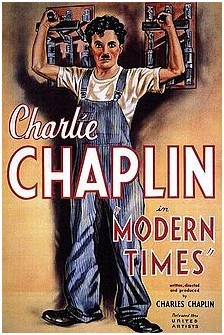

Modern Times is a 1936 comedy film written and directed by Charlie Chaplin in which his iconic Little Tramp character struggles to survive in the modern, industrialized world. The film is a comment on the desperate employment and fiscal conditions many people faced during the Great Depression, conditions created, in Chaplin's view, by the efficiencies of modern industrialization. The movie stars Chaplin, Paulette Goddard, Henry Bergman, Stanley Sandford and Chester Conklin.
Modern Times was deemed "culturally significant" by the Library of Congress in 1989, and selected for preservation in the United States National Film Registry. Fourteen years later, it was screened "out of competition" at the 2003 Cannes Film Festival.
Plot
Modern Times portrays Chaplin as a factory worker employed on an assembly line. After being subjected to such indignities as being force-fed by a "modern" feeding machine and an accelerating assembly line where he screws nuts at an ever-increasing rate onto pieces of machinery, he suffers a nervous breakdown and runs amok, throwing the factory into chaos. He is sent to a hospital. Following his recovery, the now unemployed factory worker is mistakenly arrested as an instigator in a Communist demonstration. In jail, he accidentally ingests smuggled cocaine, mistaking it for salt. In his subsequent delirium, he stumbles upon a jailbreak and knocks out the convicts. He is hailed a hero and is released.
Outside the jail, he discovers life is harsh, and tries to get arrested after failing to get a decent job. He runs into an orphaned gamine girl (Paulette Goddard), who is fleeing the police after stealing a loaf of bread. To save the girl, he tells police that he is the thief and ought to be arrested. A witness reveals his deception and he is freed. To get arrested again, he eats an enormous amount of food at a cafeteria without paying. He meets up with the gamine in the paddy wagon, which crashes, and the girl convinces the reluctant factory worker to escape with her. Dreaming of a better life, he gets a job as a night watchman at a department store, sneaks the gamine into the store, and even lets burglars have some food. Waking up the next morning in a pile of clothes, he is arrested once more.
Ten days later, the gamine takes him to a new home—a run-down shack that she admits "isn't Buckingham Palace" but will do. The next morning, the factory worker reads about a new factory and lands a job there. He gets his boss trapped in machinery, but manages to extricate him. The other workers decide to go on strike. Accidentally paddling a brick into a policeman, he is arrested again. Two weeks later, he is released and learns that the gamine is a café dancer. She tries to get him a job as a singer. By night, he becomes an efficient waiter though he finds it difficult to tell the difference between the "in" and "out" doors to the kitchen, or to successfully deliver a roast duck to table through a busy dance floor. During his floor show, he loses a cuff that bears the lyrics of his song, but he rescues his act by improvising the story using an amalgam of word play, words in (or made up of word parts from) multiple languages and mock sentence structure while pantomiming. His act proves a hit. When police arrive to arrest the gamine for her earlier escape, they escape again. Finally, we see them walking down a road at dawn, towards an uncertain but hopeful future.
Reception
Modern Times is often hailed as one of Chaplin's greatest achievements, and it remains one of his most popular films. French philosophers Jean-Paul Sartre, Simone de Beauvoir and Maurice Merlau-Ponty named their journal, Les Temps modernes, after it.[4] The iconic depiction of Chaplin working frantically to keep up with an assembly line inspired later comedy routines including Disney's Der Fuehrer's Face (Donald Duck alternately assembling artillery shells and saluting portraits of Adolf Hitler) and an episode of I Love Lucy titled "Job Switching" (Lucy and Ethel trying to keep up with an ever-increasing volume of chocolate candies, eventually stuffing them in their mouths, hats, and blouses). This was Chaplin's first overtly political-themed film, and its unflattering portrayal of industrial society generated controversy in some quarters upon its initial release.
The film exhibits notable similarities to a 1931 French film directed by René Clair entitled À nous la liberté (Liberty for Us) — the assembly line sequence is a clear instance. The German film company Tobis Film sued Chaplin following the film's release to no avail. They sued again after World War II (considered revenge for Chaplin's later anti-Nazi statements in The Great Dictator).[5] This time, they settled with Chaplin out of court. À nous la liberté director Clair was an outspoken admirer of Chaplin, was flattered by the notion that the film icon might imitate him, deeply embarrassed that Tobis Film would sue Chaplin and was never part of the case.
The film did attract criticism for being almost completely silent, despite the movie industry having long since embraced the talking picture. Chaplin famously feared that the mystery and romanticism of the tramp character would be ruined if he spoke, and feared it would alienate his fans in non-English speaking territories. His future films, however, would be fully fledged "talkies" – although without the character of the Little Tramp.
American Film Institute recognition
AFI's 100 Years... 100 Movies - #81
AFI's 100 Years... 100 Laughs - #33
AFI's 100 Years of Film Scores - Nominated[6]
AFI's 100 Years... 100 Movies (10th Anniversary Edition) - #78



















